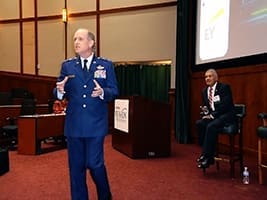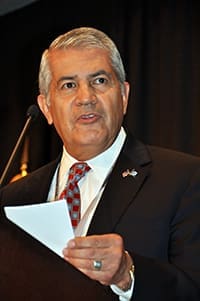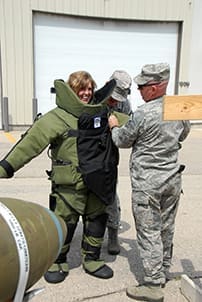A cyber attack on the energy sector could be devastating and would be felt at homes, schools, businesses and government as our reliance on technology continues to grow. That’s why the time is now for the private sector and government to come together to prepare and respond to these threats.
MILWAUKEE - Power outages. Crashed government service websites. Pilfered personal information from corporate or government databases. A world increasingly interconnected through the Internet also provides numerous opportunities for individuals or groups to visit malice or mischief upon people, businesses, utilities and government agencies.
The focus of Wisconsin's third annual Cybersecurity Summit was defending the state's operational infrastructure, such as power grids, information databases, communication networks and utilities. But an underlying theme was expanding knowledge of the adversary, of one's own weaknesses, and the difference between an attack and a routine system scan.
Gov. Scott Walker opened the summit by noting that cybersecurity has only become more important over the past two years.
How would utilities and state agencies respond to a massive blackout or grid failure to hit Wisconsin? That question was discussed at a national energy infrastructure security summit held July 20-22, 2015 in Washington, D.C.
As part of the Electric Infrastructure Security (EIS) Summit VI held at the U.S. Capitol, some of Wisconsin's top utility, emergency management and homeland security officials were invited to discuss Wisconsin's plans to such events. Maj. Gen. Don Dunbar, Wisconsin adjutant general and Wisconsin's Homeland Security Advisor, chaired the panel on opportunities and challenges facing Wisconsin. Joining him were Wisconsin Emergency Management Administrator Brian Satula; Mike Huebsch, commissioner with the Wisconsin Public Service Commission; and David Wojtczak with American Transmission Company (ATC).
It wasn't quite the movie Wizard of Oz, but there was still a small dog, talk of tornadoes and a puff of smoke last Friday at Miller Park, as 11,000 students and teachers from southeastern Wisconsin attended Weather Day.
Weather Day provides students an opportunity to learn about seasons, precipitation, climates and storms in a fun environment. Participants are divided into two teams, and questions were asked on the jumbo screen, along with videos and demonstrations on the field. The event was sponsored by the Milwaukee Brewers and WTMJ-TV, whose meteorologists were the hosts.
A major tornado outbreak might be a chance occurrence in Wisconsin, but one with very real repercussions.
The response to the potential damage and threat to life cannot be left to chance. That’s why local and state agencies teamed up July 15-16 for the Tri-County Exercise — a training scenario in which several tornadoes touched down within hours of each other, causing numerous fatalities and major damage to roads, bridges and buildings throughout southeast Wisconsin.
Educators took on the role of students last month, when a group of teachers from Sun Prairie toured Wisconsin National Guard facilities and the Wisconsin Department of Military Affairs. From June 17-18, eight educators - counselors, high school and middle school teachers - visited Wisconsin's Joint Force Headquarters for two days of speakers and tours.
The Dane County School Consortium hosts a week-long summer graduate class, where educators get credits to tour businesses and organizations. The goal was to learn about jobs, career paths and what options are out there for their students.






